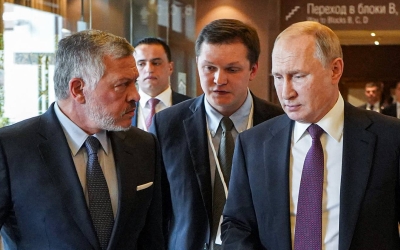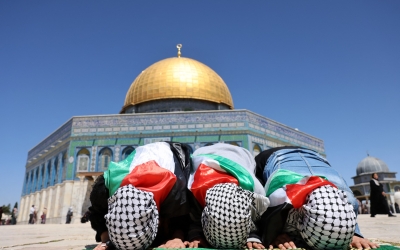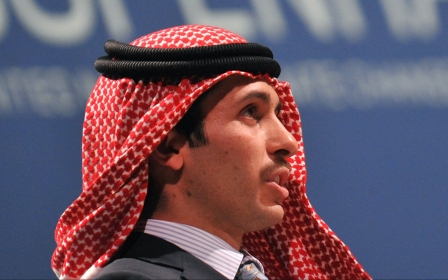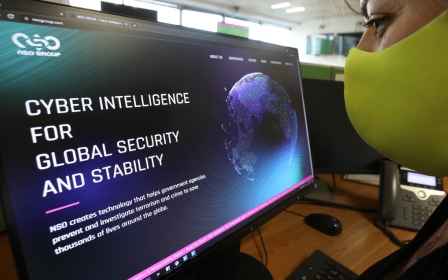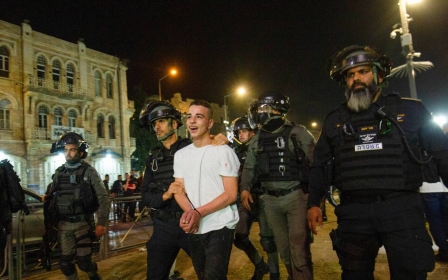Jordan runs low on diplomatic options as tensions soar in Jerusalem
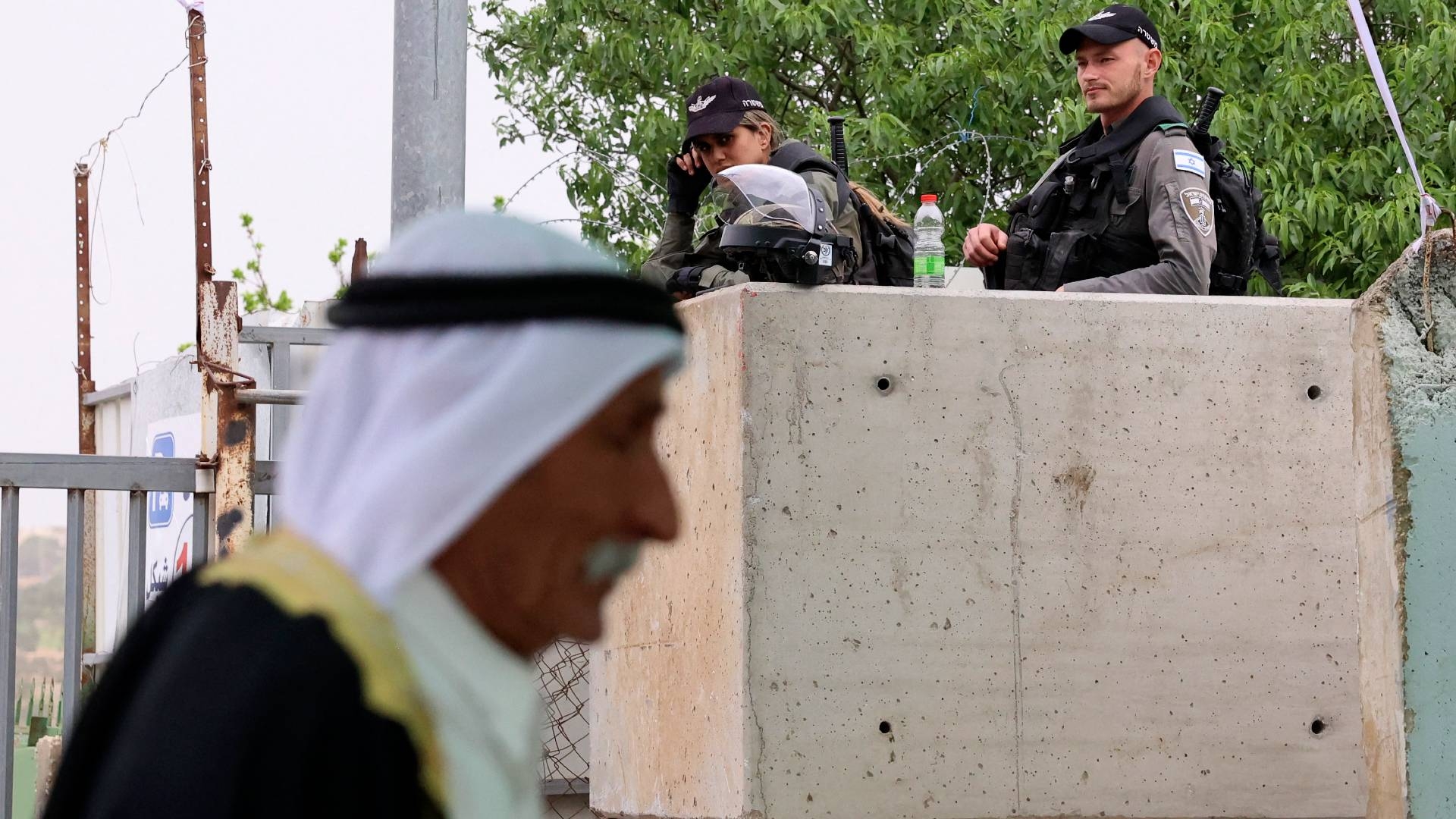
Jordan's King Abdullah has tried with little avail to reduce tensions in Israel and the occupied Palestinian territories during the Muslim holy month of Ramadan.
Israeli forces have carried out near-daily raids and operations in the occupied Palestinian territories this past week, including three raids on al-Aqsa Mosque.
At least 152 Palestinians were wounded on Friday when Israeli forces fired rubber-coated steel bullets, teargas and stun grenades inside the courtyards and prayer halls of the mosque.
Palestinians have accused Israel of escalating tensions during a rare convergence of Passover, Ramadan and Easter, when large crowds of worshippers visit Jerusalem.
'Jordan is definitely frustrated and disappointed with some of the Israeli promises that have been broken'
- Osama al-Sharif, political analyst
Last year, Israeli plans to expel Palestinian families from their homes in East Jerusalem served as the catalyst for widespread Palestinian protests across Israel and the occupied Palestinian territories.
New MEE newsletter: Jerusalem Dispatch
Sign up to get the latest insights and analysis on Israel-Palestine, alongside Turkey Unpacked and other MEE newsletters
A decision by Israeli forces to carry out raids on al-Aqsa Mosque heightened tensions further and triggered the 11-day Israeli assault on Gaza.
"It would be really difficult for King Abdullah to just sit back and allow this to happen," Tahani Mustafa, the International Crisis Group's West Bank analyst, told Middle East Eye.
During last year's Gaza offensive, tensions spilt over into Jordan, sparking mass protests on the kingdom’s border with the Israeli-occupied West Bank - protests that Jordan fears may fire up again.
Tahani said that last year's protests came from all segments of Jordanian society, not just from those of Palestinian origin, but also from Jordan's "East Bank" tribes - whose support is key to the monarchy's stability.
"So, the pressure is really on if anything does happen," she said.
US officials have been working to maintain calm in Jerusalem ahead of the anniversary of last year's conflict where 260 Palestinians were killed in Gaza, including 66 children, according to the UN.
Palestinian cause 'on the shelf'
Jordan's efforts to quell the tensions have not to any degree stymied the unrest. In anticipation of the uptick in violence, King Abdullah, the custodian of Jerusalem's Muslim and Christian holy sites, paid a rare visit to Palestinian Authority President Mahmoud Abbas earlier this month, a symbolic move on the day of the Israel-hosted Negev Summit.
The summit saw the participation of Egypt, Morocco, Bahrain, the UAE, and the US Secretary of State - another confirmation of the growing trend of Arab states normalising ties with Israel.
The Palestinians were not invited to the summit despite their ongoing occupation at the hands of Israel being a central feature of Arab-Israeli relations for the last 50 years.
Osama al-Sharif, a veteran journalist and political analyst based in Jordan, told MEE that "the Palestinian cause and the two-state solution are not even on the back burner. They're on the shelf right now."
"The only two parties that talk about it are the Palestinians themselves and Jordan."
King Abdullah's decision to not attend the summit was a "symbolic effort", reflecting his attempt to try and "leverage his way back into some relevance within the Israel-Palestine conflict", Mustafa said.
"Now that you have the new normalisation deals, there is a huge concern amongst the Jordanian regime that their role will be significantly sidelined."
For Jordan, their role in the conflict is more than one of moral character, she added, saying it brings "huge" financial, security, and diplomatic benefits, particularly from the US.
"Jordan's relevance is precisely tied to its intermediary role between the Israelis and the Palestinians," Mustafa said.
After King Abdullah's meeting with Abbas, he hosted Israeli Defence Minister Benny Gantz and Israeli President Isaac Herzog in Amman, marking the first official visit by an Israeli head of state to Jordan.
In his recent and publicly announced phone call with Israeli Minister Naftali Bennett, King Abdullah stressed the importance of "preventing provocations that could lead to an escalation".
Following the Jordanian parliament's calls to expel the Israeli ambassador in Amman, the foreign minister summoned the Israeli charge d'affaires on Monday to demand a stop to the violations at Al Aqsa.
Abdul Sattar al-Qudah, the director of the department for al-Aqsa Mosque at Jordan's Ministry of Awqaf and Islamic Affairs, told MEE that "our biggest challenge to establishing peace lies in the attempts and even the practical steps taken by the occupying power".
Peace efforts 'hit a wall'
Israel's increasingly nationalistic domestic agenda, driven by a growing number of far-right politicians, has left little space for any genuine consideration of Jordan's concerns, said Sharif.
"Jordan is definitely frustrated and disappointed with some of the Israeli promises that have been broken. Jordan's efforts have hit a wall," he said.
Jawad Anani, who served as the coordinator of the peace process negotiating team in Washington, told MEE that there has been "quite a radical shift in the Israeli realpolitik from people who wanted peace, to people who no longer want it."
Bennett refuses to engage in diplomatic talks with the Palestinians and omitted even a mention of the Palestinians in his September speech to the UN General Assembly.
Earlier this month, Israel rejected the Biden administration's proposal for a meeting with Palestinian national security advisers in Washington.
A day after Herzog visited Amman, the far-right Israeli lawmaker Itamar Ben-Gvir "toured" al-Aqsa mosque, where he called the Jordanian Waqf authorities who administer the site "terrorists".
On the same day that Bennett called King Abdullah, his coalition partner Yair Lapid made a provocative visit to Damascus Gate, a popular meeting spot for Palestinians in Jerusalem.
Jordanian political analyst Amer Sabaileh told MEE that Amman has little to no influence over far-right politicians in Israel - many of whom are key to Bennett's fragile coalition government. "This image that Jordan can play a role is not there anymore."
For over 50 years, Jordan has championed the two-state solution but "maybe it is time to face things differently", he added.
"Our position [Jordan's mediator role in the conflict] could be guaranteed by a policy of open doors and the capacity to influence everybody, not just one party."
'Diplomatic ammunition is short'
Sabaileh noted that Jordan "should be able to talk to the right in Israel" and be able to broker between the "big rifts" present in the Palestinian political structure.
Now "you don't deal with a Palestinian bloc, unfortunately, you deal with a divided Palestinian scene", he said, referencing the diverging messages appearing within the various Palestinian movements, notably Fatah, the Palestinian Authority (PA), and Hamas, of which regional actors have all chosen a partner.
"We closed many doors and today we need them open and we don't have the key," said Sabaleih.
Jordan's fractured relationship with Hamas has also left it without "the diplomatic assets" to contain last May's crisis, Sharif said.
Instead, it was Egypt who "was smart enough to maintain contact with Hamas and use its diplomatic leverage to negotiate a ceasefire," he said.
"Jordan and the Palestinian Authority were only onlookers, they were on the sidelines."
According to Sabaleih, the divided political scene means the PA "will get weaker and other parties will get stronger". He pointed to the "deep ties" between actors in Gaza and actors in the West Bank, and even those inside Jordan.
"Hamas actors are in Jordan. Hamas ideology is present. The narrative among youth today is Hamas, of anti-normalisation with Israel. We saw it last year during the war in Gaza. The narrative of Hamas is everywhere."
Meanwhile, according to Sharif, Jordan has "no other option" but to try and prevent a new cycle of violence from erupting on its borders and elsewhere.
"It will have to continue, even though its diplomatic ammunition is now short. You can never bury the Palestinian cause."
Middle East Eye delivers independent and unrivalled coverage and analysis of the Middle East, North Africa and beyond. To learn more about republishing this content and the associated fees, please fill out this form. More about MEE can be found here.


